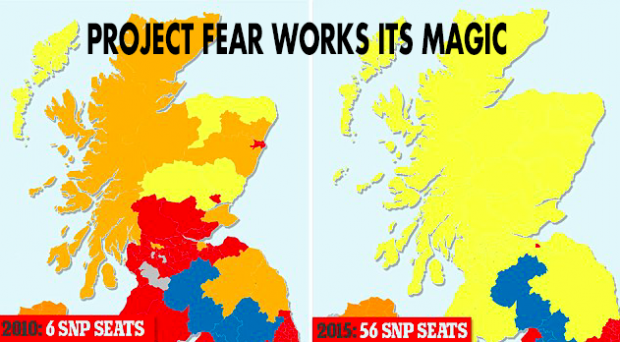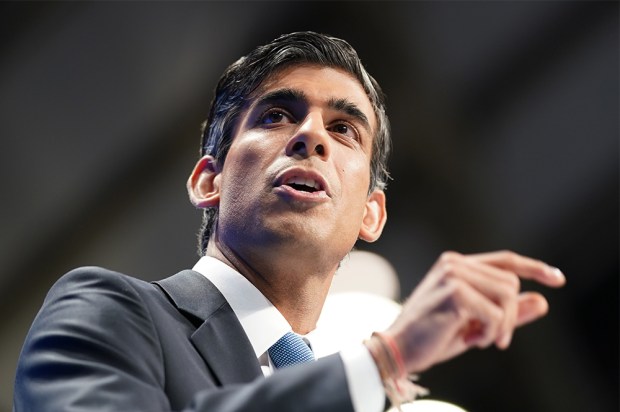Strange as it may seem, there are still people around David Cameron who regard the Scottish referendum campaign as a great success. Yes, they say, the nationalists didn’t like the original ‘Project Fear’ — the attempt to frighten Scotland into voting no — but it worked. Alex Salmond was defeated by a 10 per cent margin — proof, it’s argued, that relentless negativity works. Those who complain about it are either losers, or too squeamish to win. Andrew Cooper, chief of the Scottish ‘in’ campaign, said afterwards that the only criticism he would accept is that it was not negative enough. This attitude is a poison in the bloodstream of the Conservative party.
Voters can smell the poison in Zac Goldsmith’s disgraceful campaign for London Mayor, which will come known only for his bizarre smears against his rival, Sadiq Khan. And the positive case for Zac? Even he struggled to articulate it. He will soon see how effective all this has been. And how persuasive was Cooper’s Project Fear in Scotland? As the polls showed, it relentlessly repelled voters from unionism. A country once ambivalent about separation has been turned into an SNP one-party state.
Yes, relentless fearmongering and negativity wins elections, but its side effects are monstrous: if you have nothing good to say about yourself, only venom to spray at your opponents, then you won’t keep or recruit supporters. Pummelling a weak opponent allowed the Tories to win the last general election — but as Freddy Gray argues in this week’s cover story, it was a deceptive victory. The Conservatives have a majority (just), but the party has been hollowed out, its membership falling, its constituency associations in decay and now facing abolition.
It is no surprise that, when it came to the EU referendum campaign, Andrew Cooper was asked to revive Project Fear — to give a fix to a Tory leadership now addicted to negativity. But the wider cost of this tactic can be seen not only in Tory membership numbers, but in Scotland itself. After the referendum, the unionist parties went into meltdown. The SNP took all but three of Scotland’s 59 Westminster seats.
And this was no referendum hangover. Nicola Sturgeon’s tartan army, enthused by her optimistic talk about nationhood and destiny, is poised to win another huge victory in next week’s Holyrood elections.
The SNP (as James Forsyth details) looks certain to retain its majority in a parliament designed so that no party could ever win a majority. The Prime Minister’s response has been to keep congratulating himself on his Scottish referendum win, and pretend that the aftermath of that referendum is not happening. Astonishingly for someone who is supposed to be Prime Minister of the whole of the United Kingdom, he has not shown his face in Scotland during this campaign. He has found time to be in Wales this week, but he has not ventured north of the border.
That is both prudent and depressing; prudent because the Conservative ‘brand’ in Scotland remains tarnished by its association with the Prime Minister and his Chancellor. Depressing because it makes Mr Cameron seem as though he is a foreigner in his own country. In many ways he is — and he is not alone. Frank Field spoke for many English MPs this week when he observed that Scotland is ‘another country’ whose independence is now all but inevitable. The post-referendum realignment of Scottish politics has not just sunk the Scottish Labour party. It has driven a wedge between Scotland and the rest of the United Kingdom. North and South Britain feel more estranged than ever.
As Robert Burns put it, ‘The best-laid schemes o’ mice an’ men/ Gang aft agley.’ Far from cementing Scotland’s place within a reformed Union, devolution (and Westminster’s botched response to it) has offered the nationalists a path to independence. Of Holyrood’s 73 constituencies, 66 are likely to return a nationalist MSP. This system distorts reality: Scotland is a country evenly divided between nationalists and unionists, but one camp will take home all the prizes.
The architecture of devolution hands the SNP another advantage: the nationalists can simultaneously be in power and in opposition; they govern Scotland while remaining opposed to whichever unionist party happens to be in power at Westminster. The deck is rigged in their favour and Nicola Sturgeon, like her predecessor Alex Salmond, is an accomplished card sharp. Her popularity is for the time being unassailable. The referendum realigned Scottish politics. It made little sense for ‘yes’ voters to continue to support unionist parties after the referendum and most have followed that logic to its inevitable conclusion: a vote for the SNP. Ms Sturgeon’s party now has more members than the British army has soldiers.
Nicola Sturgeon has shown that, contrary to conventional wisdom, people are interested in politics — they will turn up to meetings, and join parties if the message inspires them. This week, The Spectator sold out all 2,200 seats in the London Palladium on our debate about the EU referendum. There is plenty of enthusiasm for politics, which can be harnessed by political leaders bold and imaginative enough to give people something vote for — rather than just an enemy to vote against.
A referendum is a clarifying moment but not necessarily a decisive one. The independence referendum caused a breach between Scotland and the Westminster parties that now feels wider than ever. Negativity and fearmongering can win a referendum, but it is also toxic to the popularity and strength of any political movement. Something that David Cameron, or his successor, may have plenty of time to reflect upon once the EU referendum is over.
Got something to add? Join the discussion and comment below.
Get 10 issues for just $10
Subscribe to The Spectator Australia today for the next 10 magazine issues, plus full online access, for just $10.















Comments
Don't miss out
Join the conversation with other Spectator Australia readers. Subscribe to leave a comment.
SUBSCRIBEAlready a subscriber? Log in